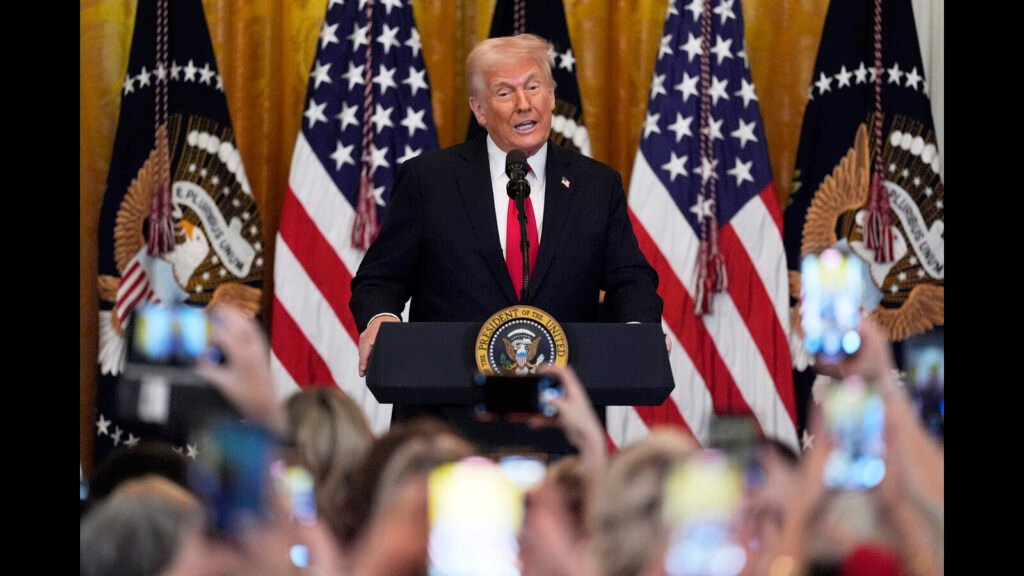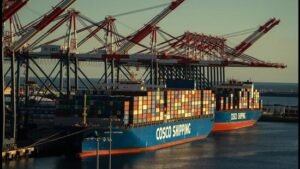
Since His First Presidential Run in 2016, Donald Trump has championed a shift towed economy Insularity. While his first term was marked by a protectionist ageda, he has taken it to new heights since returning to office on January 20 by making tarifs, trade wars, and new Washington’s Economic Playbook.

The President and His Advisors Frame His America First Trade Policy as Measures to Protect American Industry and Jobs. This is a strategic miscalculation. America is fighting yesterday’s battles while ignoring its most powerful current economy asset – its dominance in the global services economy.
Historically, the US has always styed ahead of the global ear. It LED the World ITO Industrialization in the Second Half of the 20th Century While Much of the Globe remained agarian.
Today, it stands at the forefront of the digital economy, while many other nations are still focused on manufacturing. Yet, Intead of Reinforcing this Forward Momentum, The Current Policy Approach representations a shift backwards. Such a shift would isolate the US from its competitive advantage in a rapidly globalising services sector.
Consider the Numbers: According to the Bureau of Economic Analysis, In 2023, The US Exported $ 1.03 Trillion in Services and Imported $ 748.2 billion, resulting in a substantial trade. The Country Accounted for 12.5% of Global Service Exports, Far Surpassing Any Other Nation.
These numbers make it apparent that even at its current trade deficit overalls to Attract political ire, the US runs a massive trade surplus in services. The us has a clear and sustained lead in area like Finance, Cloud Computing, Higher Education, Consulting, Entertainment, And Emerging Sector Such as AI and Software-ASA-AAS-SERVICE (SAAS).
At the heart of this dominance in services are the so-called “Magnificent 7” Companies: Apple, Amazon, Microsoft, Alphabet, Meta, Nvidia, and Tesla. The Seven Tech Giants Had a Combined Market Cap of $ 17.6 Trillion at the end of last year, four-a-a-hourf times the size of India’s GDP.
These companies are not just tech titans. They are Modern Trade Powerhouses, Generating Enormous International Revenue through digital infrastructure, artificial intelligence (ai) platforms, cloud services, Autoneomous Systems, and Global Logistics. These firms thrive not in closed economies, but in open, connected markets. Trade barriers would only limit their reach and reduce the competitive edge the US currently enjoys.
Yet, The Trump Administration seems determined to apply an outdated Industrial-age playbook to a 21st-textury digital economy. The consequences of such protectionism are alredy being clear. While Smaller Economies Have Occasionally Made Concepts Under Pressure, Larger Trading Partners are Increasing Pushing Back.
Canada, Mexico, and the European Union, Historically America’s Closest Allies, Have Signalled Frustration with Washington’s Tariff-FIRST SPROACH and MAY SOON TOWARN TOWARN TORN TORN TORN TORN TORN TOWD EACH ROUNSHIPS If tensions escalate further.
Strategic alignments in asia are shifting in real time. Just last week, the foreign ministers of China, Japan, and South Korea, Three Countries that Once Sat Uneasily in the same Room, Met in Tokyo to Signal Deepening Regional Cooperation. “Our three nations have a combined population of Nearly 1.6 billion and an economic output exceed Foreign minister wang yi said after their meeting.
While the us economy remains the largest in the world at Around $ 30 Trillion, The Formation of Alternative Trade Allians Cold Undercut America’s Economic Leverage.
If these trends continue, the fallout won just be geopolitical. America’s Thriving Services Ecosystem, which relaes on Seamless Digital Trade, Open Standards, and Regulatory Cooperation, will be the first casualty. Tarifs and Isolationism Won’T Protect this sector. They’ll undermine its growth and global reach. For instance, India is the largest market for Facebook, with Nearly 380 Million Users, More than the entrere population of the us. Whatsapp, Another meta-Owned Platform, has over 538 million users in the country.
If new delhi was to shut down access to Facebook and whatsapp, it wouldn Bollywood just be a domestic disrupt; It would deal a significant blow to a major us tech company. In such a Scenario, it’s the us economy and its innovation ecosystem that would ultimately feel the pain.
This is why the us should be shaping, not shunning, the rules of the modern global economy. The next economic hegeemon won’t be the country that builds the tallest tariff wall, but the one that writes the rules of digital engine.
Unfortunately, Trump’s Political Philosophy is Rooted in Grievance. He portrays a world in which America is being exploited by other nations, and Americans are cast as the ultimate victims.
This is truly ironic. The us is the nation that championed free trade and the global exchange of goods and services. These Principles have helped it relief to unparalled heights in Nearly Everyday Field of Human Endeavor. For america to turn its back on these ideals would not only be self-defeating; It would carry profit consortes for it in the global economic order.
America’s Greatest Strength Today Lies Not in Returnchment but innovation, Openness, and Leadership in Services. Rather than playing defense, it’s time to lead with a strategic vision.
Washington must Pivot Away from Protectionist Nostalgia and Champion a Trade Agenda That Leverages Its Unmatched Global Advantages. It must continue to build networks, not walls.
Frank f islam is an entrepreneur, Civic Leader, and Thought Leader Based in Washington Dc. The views expressed are personal






